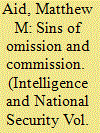| Srl | Item |
| 1 |
ID:
171237


|
|
|
|
|
| Summary/Abstract |
This article reveals for the first time why a Nazi war criminal named Günter Ebeling who was employed by the American Counter Intelligence Corps (CIC) in occupied Germany was violently killed by British intelligence officers. Through analysis of hitherto unpublished Intelligence Division documents, it argues that existing debates concerning the post-war employment of Nazi war criminals in occupied Germany have been framed in the wrong light. Discussions concerning security and control, not morality, usually surrounded disputes regarding the employment of Nazis. Close and comparative analysis of Ebeling’s recruitment and ‘dismissal’ with that of several other Nazis demonstrates that hindsight, source limitations and a prevalent case study approach have prevented the identification of common reasoning concerning security and control which surrounded the post-war employment of war criminals in several areas of intelligence work. Indeed, new evidence suggests that the British and American intelligence services employed some Nazi war criminals in post-war Germany as part of a wider strategy of control designed to ensure the security of the occupation and pave the way for a future democratic Germany. Through the analytical prism of security and control, this article provides a synthesis between a multitude of case studies.
|
|
|
|
|
|
|
|
|
|
|
|
|
|
|
|
| 2 |
ID:
106324


|
|
|
|
|
| Publication |
2011.
|
| Summary/Abstract |
American intelligence professionals have long understood that the US intelligence community is, and always has been, a closed and insular society, with each agency within the intelligence community taking pride in having its own unique bureaucratic identity, distinct corporate culture, operating environments, social dynamics, and internal behavior patterns that have been molded and shaped by external events and internal forces over the past 60 years. These 'strategic cultural' factors mean that the agencies comprising the US intelligence community are, in many respects, unique bureaucratic entities, operating far differently than comparable large American corporations and government agencies. These strategic cultural factors shape and define the environment within which the US intelligence agency works, dictate how American intelligence agencies perform their mission, and also help to explain why they repeatedly make the same mistakes and find it difficult to fix the longstanding problems which contributed to the failures. Within the context of the recent 9/11 and Iraqi weapons of mass destruction intelligence failures, this article explores the role played by these strategic cultural factors in helping to explain a series of historical intelligence failures by the US intelligence community.
|
|
|
|
|
|
|
|
|
|
|
|
|
|
|
|